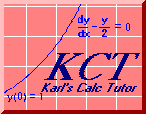

The problem 2 had you apply the chain rule to find the derivative of
f(x) = bcxAnd you found that
f'(x) = c ln(b) bcxThis problem asked you to substitute 1/ln(b) for each occurrence of c. Problem 2 asked you to figure out what happens to the derivative of an exponential if you multiply x by an arbitrary real number, c. This problem is asking you to determine what happens to the derivative of an exponential if you specifically multiply x by the reciprocal of the natural log of the base (which is, after all, a real number). So we have
f(x) = b(1/ln(b))x = bx/ln(b)Making the same substitution in the expression for f'(x) you have
f'(x) = (1/ln(b)) ln(b) b(1/ln(b))xObserve that the 1/ln(b) cancels with the ln(b) when you multiply them together. That leaves you with
f'(x) = b(1/ln(b))x = bx/ln(b)But isn't that precisely the expression we had for f(x)? Doesn't that strike you as strange that a function can be its own derivative. So the unusual and interesting property of this function is
f(x) = f'(x)And it works no matter what positive real number you choose for b. In second semester calculus, this property will loom large when you study differential equations. In the next section we shall show (among other things) that when you take
f(x) = b(1/ln(b))x = bx/ln(b)it doesn't matter at all what positive value you choose for b. This function is the same function regardless what choice you make.
email me at hahn@netsrq.com